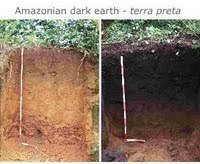Biochar - what is this stuff and why would we be interested anyway?
At its simplest biochar is any organic matter, such as wood, leaves, straw or twigs which has been heated up to the point where it 'chars' (goes black). If you have ever burnt toast you've seen this in action. Charcoal used for cooking is a form of biochar, however the term is usually reserved for when the black char is added to the ground as a soil improver.
Why would anyone want to add biochar to their soil?
Believe it or not the Amazonian rainforests in South America, notorious for poor quality soils, slash and burn agriculture and environmental disasters, once supported a vast population and a network of villages and roads. This is a massive upheaval of the popular wisdom of small tribal settlements living in harmony with pristine rainforest.These populations were supported by 'terra preta' - dark soils deliberately made by adding biochar over many many years. Some terra preta soils consist of dark layers of highly fertile soil up to 6 feet thick and still contain the trapped carbon today that was first buried hundreds, or even thousands of years ago.
|
The exact mechanisms by which fertility is improved are still being worked out, but the basic gist is that nutrients are prevented from leeching away by the porous carbon. The carbon also provides a 'home' for beneficial bacteria and fungii and help overall soil health to thrive. |
Using terra-preta for carbon sequestration?
One major contributing factor to overall increases in atmospheric carbon dioxide levels has been the steadily decreasing mass of carbon stored in the earth agricultural soils. Modern exploitative farming methods reduce the organic matter within soils to the point where the soil becomes little more than an inert substrate which fertilizers are spread on. Increasing overall carbon levels in the soils removes that carbon from the atmosphere.
The best bit from an environmental standpoint is that biochar, as opposed to compost or manure, once added to soil is permenantly stable - the carbon trapped in it is effectively removed indefinitely from the carbon cycle. Making biochar and adding it to your soil actually reduces the overall amount of Carbon Dioxide, the main gas contributing to global warming.
This is known as Carbon Sequestration and is something governments worldwide are investing huge amounts of money in. Don't they know it can be made in the backyard for free?
Summary of benefits
- Sequesters Carbon, offsetting carbon released through burning fossil fuels
- Reduces nutrient leeching from soils by binding nutrients
- Improves soil health by providing surfaces for beneficial bacteria and fungi to live on
Not half bad for a few pounds of the black stuff! And all made from garden or agricultural wastes.
I've spent quite a bit of time learning how to make charcoal to add to my own veggie patches and for me it serves a multitude of purposes. I can get rid of bulky garden wastes that are not suitable for burning in my wood stove, it improves the soil and does a little bit to offset my personal carbon footprint.
If you have time, space and stuff to burn it is well worth a shot!
References
If you want to find out more about the potential of chared organic matter to improve both soil fertility and sequester carbon you could check out this site or explore many of the sites and articles on the internet. This is a fascinating subject and I've barely scratched the surface here.
... in the News
Sept 2012CoolPlanet is at the cutting edge in biochar production. They use top of the range chemical processing facilities to convert raw biomass to both biochar and high value liquid fuels. They have a mobile refinery that can be taken to direct to logging sites and process vast quanities of waste biomass. They totally bypass one of the big problems with traditional biomass production systems - the fossil fuel use associated with transporting low grade wastes to be processed. Instead all that leaves site is tankers full of refined, highly valuable liquid fuels and biochar ready to be added to soils. Expect to hear more about this over the next few years. [Update Nov 2012 - they have changed their website to be more glitzy and less helpful. They really do have cutting edge technology though...] |
Sept 2012Jamaican businesses are investigating adding biochar production as a second source of revenue alongside traditional bamboo products in an emerging industry. |

